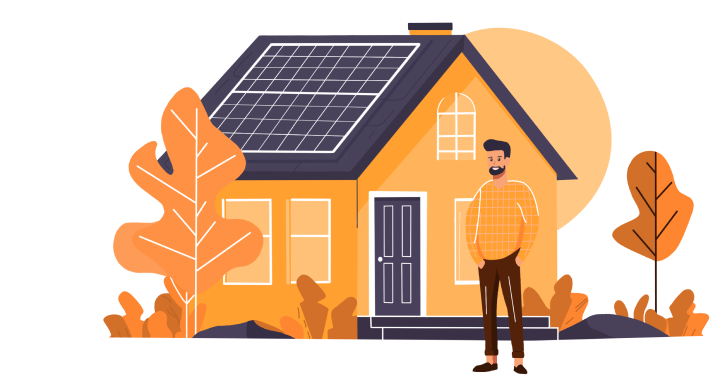Are you weighing the pros and cons of roof and solar panel installation? All the information can be overwhelming, but Solar Energy Host is here to streamline the process.
Read on as we share five expert tips to help you assess your roof's suitability and understand the costs and processes when you install a solar panel.
Tip #1: Assess your roof's strength and shading conditions.
Before considering roof and solar panel installation, make sure your roof is strong enough to hold them. It's a good idea to have a professional check it first, so they can look at things like the roof's age and any repairs needed.
The direction and tilt of the roof are also important factors that affect solar panel efficiency. In the U.S., roofs facing south get the most sun. If south isn't possible, southeast or southwest can work too. Make sure there's no shade from trees or buildings that could block the sun.
Sometimes, you might need to make certain modifications before solar PV panel installation. This is to strengthen the roof or change its slope to better catch sunlight for the solar panels.
Tip #2: Calculate monthly energy consumption.
Start by looking at your electricity bills to figure out your average monthly energy use, measured in kilowatt-hours (kWh). The number of solar panels you need depends on your roof and your location, which affects how much sunlight your home gets.
To optimize your setup, consider the best roof solar panels for maximizing solar energy capture, tailored to your home's roof space for solar panels.
To figure out how many panels you need, use this formula: number of panels = system size / (production ratio × panel wattage).
For example, if you need a system for 900 kWh per month and you use 400-watt panels with a production ratio suited for your area, you might need between 17 and 25 panels. This takes into account the local solar conditions and panel wattage, which usually ranges from 250 to 400 watts.
Tip #3: Analyze cost factors.
The typical solar installation cost can vary widely. It depends on the brand and solar panel efficiency of the panels, how much sunlight your area gets, and extra features like inverters or storage systems. Opting for affordable solar panels may reduce upfront costs while meeting residential needs, especially for residential roof solar installations.
Installing solar panels is an investment that can double or triple your savings over time. Over their lifespan (which typical last 25 years), you can save a lot, depending on local electricity rates and how well your solar system performs.
It usually takes about seven years to break even on your initial investment. After that, the electricity you generate is almost free, except for the low maintenance costs since solar panels are quite durable.
Tip #4: Select the appropriate solar panel type.
Solar panels mainly come in three types:
- Monocrystalline panels are the most efficient, often reaching efficiency rates of up to 22.8 percent, making them ideal for homes with limited roof space for solar panels.
- Polycrystalline panels are less efficient but cost-effective and suitable for larger spaces where panel numbers aren't constrained by roof size.
- Thin-film panels offer lower efficiency and durability but can be advantageous for certain architectural designs due to their flexibility.
Professional solar installers can help you pick the one that's suited to you based on your budget, roof and energy goals. High-efficiency panels, which can achieve over 22 percent efficiency, are great for maximizing output in limited spaces but are more expensive.
Alternatively, more affordable roof and solar panel installation options have lower efficiency but are a good choice for larger installations or when keeping costs down is important.
Tip #5: Establish a cleaning schedule.
Regular cleaning is crucial for maintaining the optimal performance of your solar panels. It's generally recommended to clean photovoltaic panels two to four times a year, but this can vary depending on your local environment, especially when considering the placement to maximize the solar installation and power generation.
If your panels are angled, rain might help keep them clean. However, in dry or dusty areas, you might need to clean them more often. Always use a soft brush and lukewarm water to avoid scratching the panels.
Frequently Asked Questions (FAQ)
What types of roofs are best for solar panel installation?
Roof and solar panel installation can be done on a variety of roof materials. Asphalt shingles are popular because they're affordable and widely available. Metal roofs are durable and easy to install panels on without drilling.
Tile roofs made of clay or concrete are strong and suitable for solar, but they may need special mounts to prevent damage. Flat or low-pitched tar and gravel roofs are also good for solar because they are durable and easy to set up correctly.
Do I need to reinforce my roof to install solar panels?
Reinforcement may be necessary for roof and solar panel installation, especially if it's older or not built to handle extra weight. It's important to have professionals assess the structural integrity of your roof, particularly if you have a fragile slate or wood roof.
Can I install solar panels on a roof with multiple angles or slopes?
You can install solar panels on roofs with various angles or slopes, though it complicates the installation. Adjustable mounts can help position the panels correctly for optimal sunlight exposure. It's wise to work with professional installers who can tailor the setup to your roof's specific layout.
Unlock Your Solar Potential with Solar Energy Host
Solar Energy Host is your trusted partner in transitioning to solar power. We provide an easy, secure way to connect with local solar providers, offering you comprehensive information and competitive quotes, all in one place. By entering basic information on our website, you engage in a process designed to deliver personalized options directly from trusted local professionals.
Our commitment to transparency and support means you receive reliable data to make informed decisions without overwhelming sales pressure. Whether you're new to solar or looking to expand your current setup, we provide helpful information about how to install solar power and the right providers for the job.
Solar Energy Host doesn't just connect you with solutions; we ensure you have the information to harness the sun's power effectively and economically. Start saving now with a free cost estimate.














